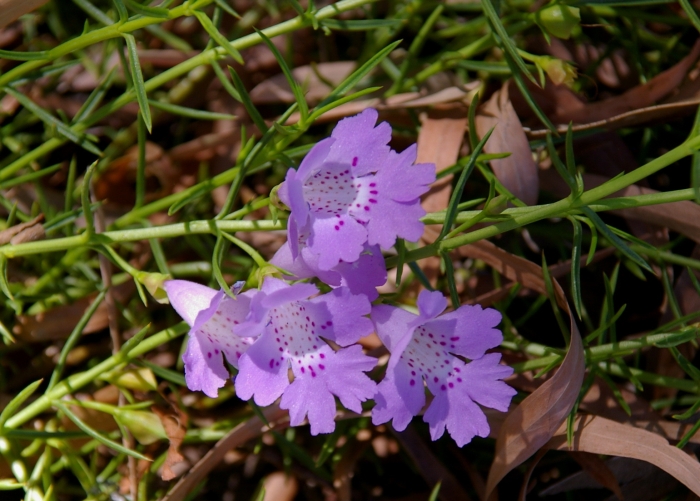Snakebush
(Hemiandra pungens)
Snakebush (Hemiandra pungens)
/
/

Percita
CC BY-SA 2.0
Image By:
Percita
Recorded By:
Copyright:
CC BY-SA 2.0
Copyright Notice:
Photo by: Percita | License Type: CC BY-SA 2.0 | License URL: https://creativecommons.org/licenses/by-sa/2.0/ | Uploader: Percita | Publisher: Flickr |























Estimated Native Range
Summary
Hemiandra pungens, commonly known as Snakebush, is an evergreen shrub native to the sandy plains and scrublands of Southwestern Australia. It exhibits a variable growth habit, ranging from a low-lying ground cover to a small shrub, typically reaching heights between 5 cm to 100 cm. The plant is characterized by its stiff, pungent leaves and tubular flowers, which are spotted and can be white, pink, or bluish-purple. The flowers are most abundant in spring but can appear sporadically throughout the year, adding a splash of color to the garden. Snakebush is particularly noteworthy for its ability to attract pollinators such as bees.
Snakebush is valued for its drought tolerance and is often used in xeriscaping, rockeries, and coastal gardens due to its adaptability to dry conditions. It thrives in full sun and requires well-drained soils, preferably sandy, with moderate to low water once established. While not typically available from seed, H. pungens is easily propagated from cuttings and can be grafted onto related species like Westringia fruticosa to enhance its vigor. This species is suitable for container gardening, including hanging baskets, where its trailing habit can be showcased. Gardeners should be aware that Snakebush may not perform well in regions with humid summers.CC BY-SA 4.0
Snakebush is valued for its drought tolerance and is often used in xeriscaping, rockeries, and coastal gardens due to its adaptability to dry conditions. It thrives in full sun and requires well-drained soils, preferably sandy, with moderate to low water once established. While not typically available from seed, H. pungens is easily propagated from cuttings and can be grafted onto related species like Westringia fruticosa to enhance its vigor. This species is suitable for container gardening, including hanging baskets, where its trailing habit can be showcased. Gardeners should be aware that Snakebush may not perform well in regions with humid summers.CC BY-SA 4.0
Plant Description
- Plant Type: Shrub
- Height: 0.5-1 feet
- Width: 2-3 feet
- Growth Rate: Moderate
- Flower Color: Purple
- Flowering Season: Spring, Summer
- Leaf Retention: Evergreen
Growth Requirements
- Sun: Full Sun
- Water: Medium, High
- Drainage: Fast
Common Uses
Bee Garden, Border Plant, Butterfly Garden, Groundcover, Low Maintenance, Potted Plant, Rock Garden, Showy Flowers, Street Planting
Natural Habitat
Sandy plains and scrublands of Southwestern Australia
Other Names
Common Names: Snake Plant
Scientific Names: , Hemiandra pungens, Hemiandra glabra, Hemiandra linearis, Hemiandra brevifolia, Hemiandra pungens var. grandiflora, Hemiandra pungens var. hispida, Hemiandra pungens var. incana, Hemiandra pungens var. glabra, Hemiandra hirsuta
GBIF Accepted Name: Hemiandra pungens R.Br.